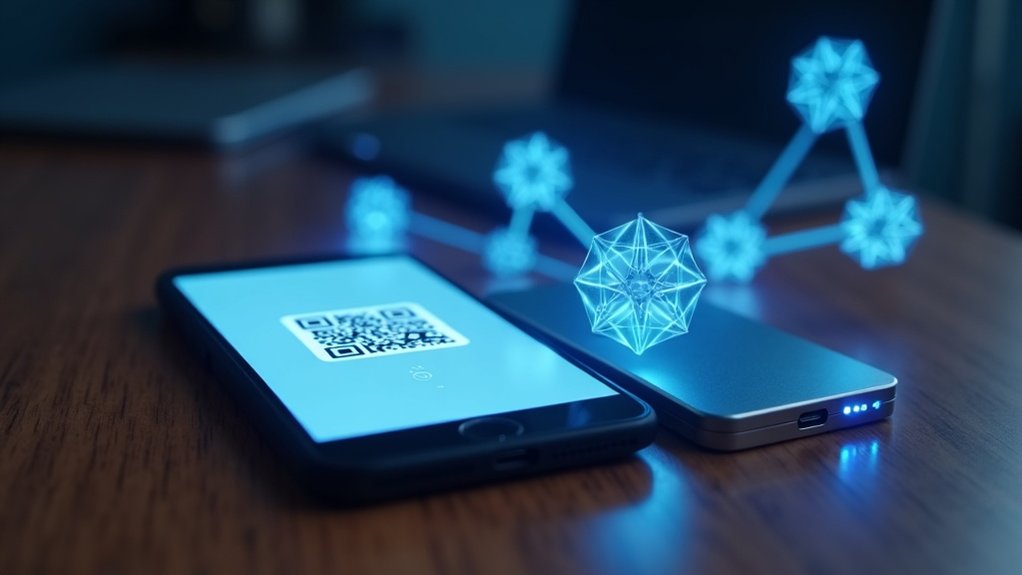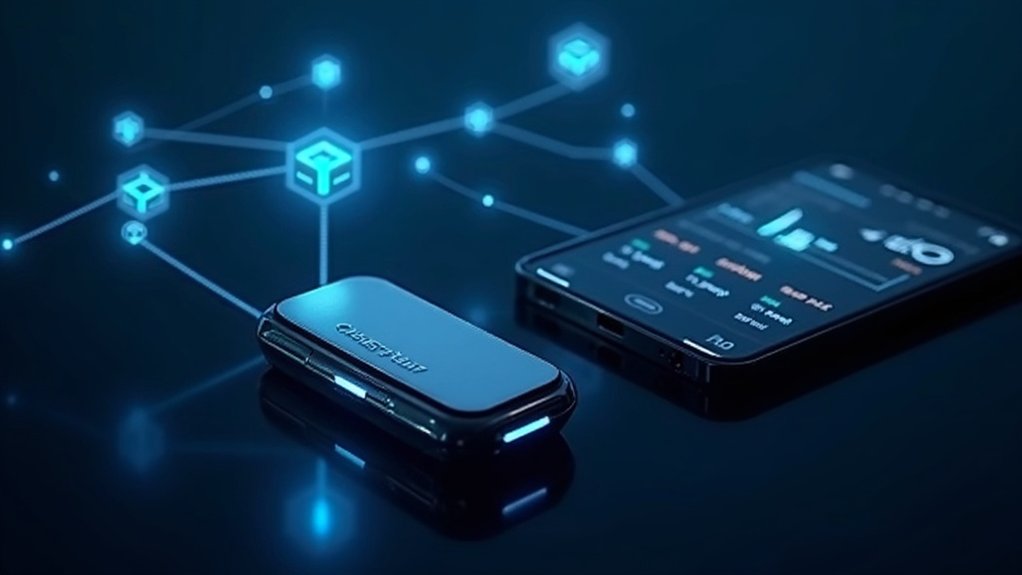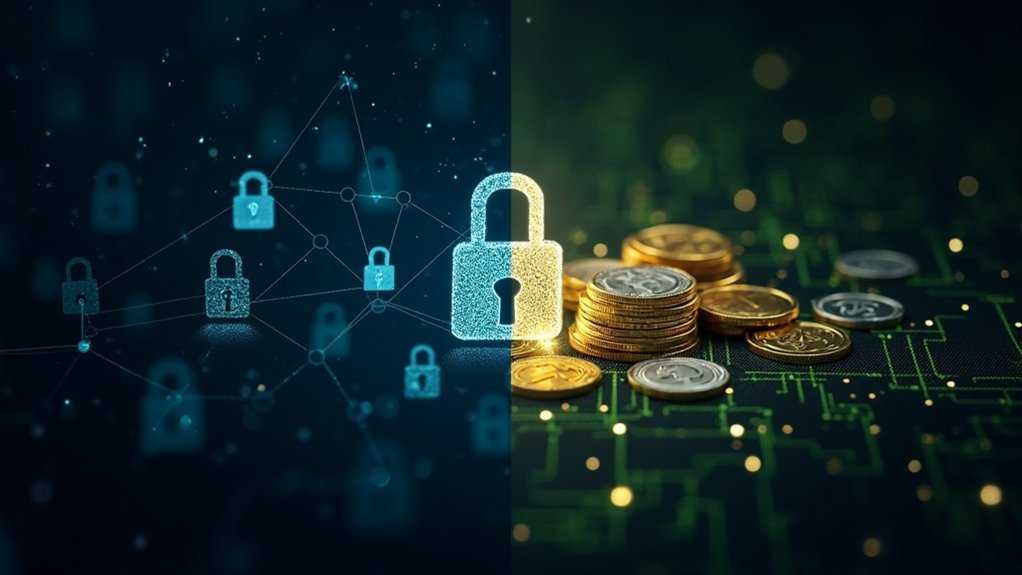A Bitcoin address is an alphanumeric string serving as your digital identity in the crypto world. Think email, but for receiving Bitcoin. These addresses start with “1,” “3,” or “bc1” and derive from your public key through one-way cryptographic hashing. Can’t reverse-engineer it. Users generate addresses through wallets—hardware options provide better security. Mixing up address formats? Your funds vanish forever. The crypto rabbit hole goes much deeper.
A Bitcoin address is your digital identity in the crypto world.
A Bitcoin address is your digital fingerprint—an anonymous yet unique identifier in the blockchain universe.
It’s an alphanumeric string that functions like an email address but for receiving Bitcoin.
Nobody sees your name or location.
Just a random-looking code that points to your spot on the blockchain.
That’s the beauty of it.
Anonymity with transparency.
These addresses come in different flavors.
They start with “1,” “3,” or “bc1.”
The newer “bc1” addresses (called SegWit or Bech32) are longer and don’t use capital letters.
Doesn’t matter which type you use – they all work the same.
Many people convert them to QR codes.
Way easier than typing 34 random characters without making a mistake.
Behind the scenes, there’s serious cryptography at work.
Every address comes from a public key, which comes from a private key.
It’s a one-way street.
You can derive an address from a private key, but you can’t go backward.
That’s what keeps your money safe.
Your address is just the final, public-facing result of mathematical hashing and encoding.
Different cryptocurrencies have different address formats.
Bitcoin has its style.
Ethereum starts with “0x.”
Get them mixed up, and your money vanishes forever.
No refunds in crypto.
No customer service to call.
You can generate addresses through software wallets, hardware wallets, or websites.
Some people prefer using hardware wallets for enhanced security when managing their Bitcoin addresses.
Some people use custodial wallets where companies hold their keys.
Others prefer noncustodial options where they control everything.
For better privacy protection, experts recommend using new addresses for each transaction you receive.
Popular services like BitPay and Coinbase offer trusted wallet solutions for beginners.
More control means more responsibility.
Using an address is straightforward.
Want to receive Bitcoin?
Give someone your address.
Want to send Bitcoin?
Enter their address in your wallet.
The blockchain records everything.
Your private key signs transactions, proving you have the right to spend from that address.
Frequently Asked Questions
Can a Bitcoin Address Be Traced Back to Its Owner?
Bitcoin addresses can be traced, but not easily.
They’re pseudonymous, not anonymous.
Law enforcement agencies use blockchain explorers, clustering algorithms, and transaction analysis to connect dots.
Exchanges with KYC requirements are the weak link—they know who owns what.
Privacy tools like CoinJoin make tracking harder, but not impossible.
Bottom line: with enough resources and determination, investigators can often link addresses to real people. Perfect anonymity? Dream on.
What Happens if I Send Bitcoin to the Wrong Address?
Sending Bitcoin to the wrong address? Kiss that money goodbye. Transactions are irreversible once confirmed on the blockchain. Period.
If it’s a valid address, the funds transfer immediately to whoever owns it. They have zero obligation to return anything.
If it’s an invalid address format, the transaction fails—no harm done.
Worst case? You sent it to a burn address or dead wallet. Those coins are lost forever, floating in crypto purgatory.
How Often Should I Change My Bitcoin Address?
Users should change their Bitcoin address with every new payment received. Period.
Modern wallets do this automatically—they’re not stupid.
Address reuse is a privacy nightmare; your transaction history becomes an open book for anyone who cares to look.
The blockchain never forgets.
HD wallets generate fresh addresses by default, backing them all up with a single seed phrase.
No need for constant manual backups.
Privacy 101: new payment, new address. Simple.
Are Bitcoin Addresses Case-Sensitive?
Some Bitcoin addresses are case-sensitive, others aren’t.
Depends on the format.
Legacy (P2PKH) and P2SH addresses? Absolutely case-sensitive.
Get a letter’s case wrong and your money’s gone. Forever.
Bech32 addresses, on the other hand, don’t care about case at all.
Type it ALL CAPS or lowercase – same difference.
Most people just copy-paste addresses anyway.
Smart move.
Nobody wants to be the person who lost Bitcoin because of a capital letter.
Can I Recover Funds Sent to an Expired Address?
Bitcoin addresses don’t actually expire. So technically, there’s nothing to “recover” from an expired address because that concept doesn’t exist in Bitcoin.
Funds sent to any address stay there permanently unless someone has the private key.
If you’ve lost access to your private key? Tough luck. Your crypto is basically locked away forever. No customer service to call, no password reset option.
That’s the beauty—and brutality—of decentralized finance.









